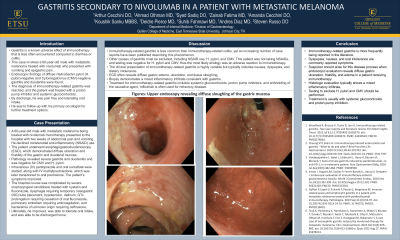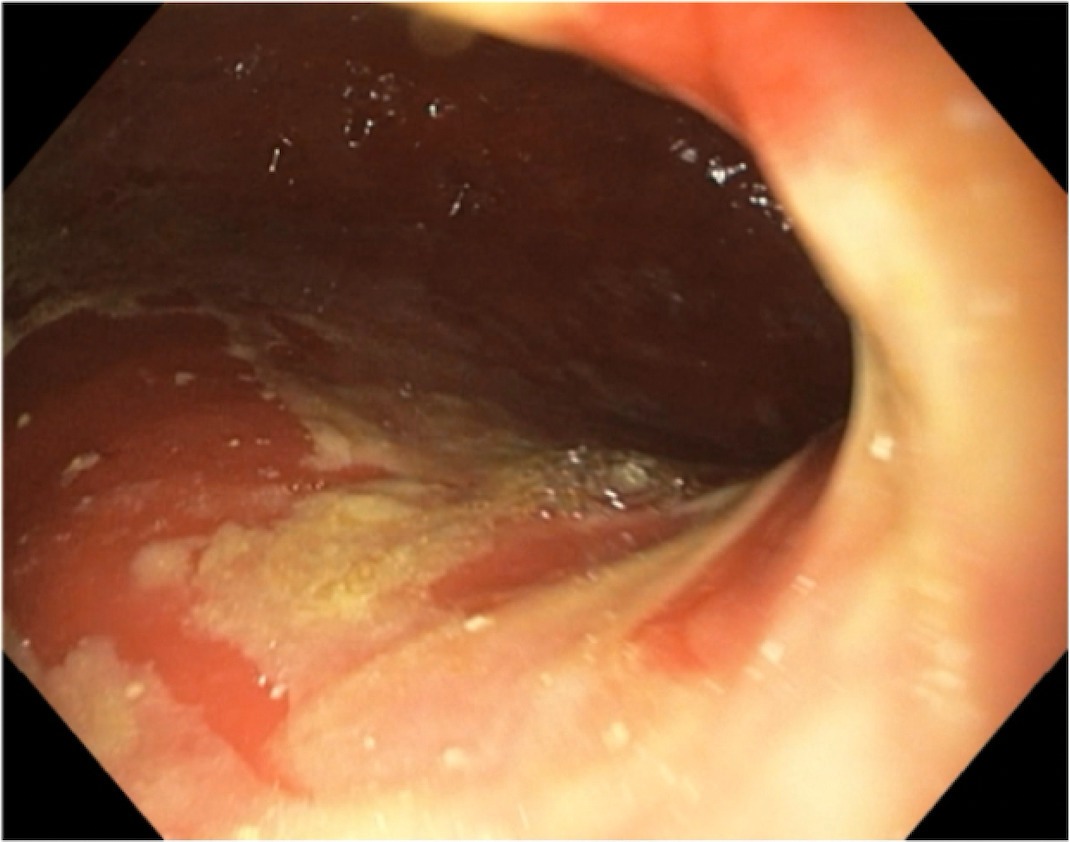Back


Poster Session B - Monday Morning
Category: Stomach
B0730 - Gastritis Secondary to Nivolumab in a Patient With Metastatic Melanoma
Monday, October 24, 2022
10:00 AM – 12:00 PM ET
Location: Crown Ballroom

Has Audio

Arthur A. Cecchini, DO
East Tennessee State University
Johnson City, TN
Presenting Author(s)
Arthur A. Cecchini, DO1, Ahmad Othman, MD2, Madeeha Sadiq, DO1, Zainab Fatima, MD1, Amanda Cecchini, DO1, Koushik Sanku, MBBS1, Deidre Pierce, MD1, Suhib Fahmawi, MD1, Andres Diaz, MD1, Steven M. Russo, DO1
1East Tennessee State University, Johnson City, TN; 2East Tennessee State University's Quillen College of Medicine, Johnson City, TN
Introduction: Gastritis is an adverse effect of immunotherapy that is less commonly reported than diarrhea or colitis. This case involves a 60-year-old male presenting with vomiting and abdominal pain with upper endoscopy revealing diffuse Helicobacter pylori (H. pylori) and Cytomegalovirus (CMV)-negative gastritis and duodenitis. The eventual diagnosis of immunotherapy-related gastritis was reached, and the patient was treated with proton pump inhibitors and systemic glucocorticoids.
Case Description/Methods: A 60-year-old male with metastatic melanoma being treated with nivolumab monotherapy presented to the hospital with two weeks of abdominal pain and vomiting. He declined nonsteroidal anti-inflammatory (NSAID) use. The patient underwent esophagogastroduodenoscopy (EGD), which demonstrated diffuse ulceration and friability of the gastric and duodenal mucosa. Pathology revealed severe gastritis and duodenitis and was negative for CMV and H. pylori. Intravenous (IV) pantoprazole and oral sucralfate were started, along with IV methylprednisolone, which was later transitioned to oral prednisone. The patient’s symptoms improved. The hospital course was complicated by severe oropharyngeal candidiasis treated with nystatin and fluconazole, dysphagia requiring temporary nasogastric (NG) tube placement, hypotension, delirium, QTc prolongation requiring cessation of oral fluconazole, pulmonary embolism requiring anticoagulation, and bacteremia of unknown origin requiring ceftriaxone. Ultimately, he improved, was able to tolerate oral intake, and was able to be discharged home.
Discussion: Immunotherapy-related gastritis is less common than immunotherapy-related colitis, yet an increasing number of case reports have been published describing this phenomenon. Other causes of gastritis must be excluded, including NSAID use, H. pylori, and CMV. This patient was not taking NSAIDs, and testing was negative for H. pylori and CMV, thus the most likely etiology was an adverse reaction to immunotherapy. The clinical presentation of immunotherapy-related gastritis is highly variable but typically includes dyspepsia and dietary intolerance. EGD often reveals diffuse gastric edema, ulceration, and tissue sloughing. Biopsy demonstrates a mixed inflammatory infiltrate consistent with gastritis. Treatment for immunotherapy-related gastritis includes systemic glucocorticoids, proton pump inhibitors, and withholding of the causative agent. Infliximab is often used for refractory disease.

Disclosures:
Arthur A. Cecchini, DO1, Ahmad Othman, MD2, Madeeha Sadiq, DO1, Zainab Fatima, MD1, Amanda Cecchini, DO1, Koushik Sanku, MBBS1, Deidre Pierce, MD1, Suhib Fahmawi, MD1, Andres Diaz, MD1, Steven M. Russo, DO1. B0730 - Gastritis Secondary to Nivolumab in a Patient With Metastatic Melanoma, ACG 2022 Annual Scientific Meeting Abstracts. Charlotte, NC: American College of Gastroenterology.
1East Tennessee State University, Johnson City, TN; 2East Tennessee State University's Quillen College of Medicine, Johnson City, TN
Introduction: Gastritis is an adverse effect of immunotherapy that is less commonly reported than diarrhea or colitis. This case involves a 60-year-old male presenting with vomiting and abdominal pain with upper endoscopy revealing diffuse Helicobacter pylori (H. pylori) and Cytomegalovirus (CMV)-negative gastritis and duodenitis. The eventual diagnosis of immunotherapy-related gastritis was reached, and the patient was treated with proton pump inhibitors and systemic glucocorticoids.
Case Description/Methods: A 60-year-old male with metastatic melanoma being treated with nivolumab monotherapy presented to the hospital with two weeks of abdominal pain and vomiting. He declined nonsteroidal anti-inflammatory (NSAID) use. The patient underwent esophagogastroduodenoscopy (EGD), which demonstrated diffuse ulceration and friability of the gastric and duodenal mucosa. Pathology revealed severe gastritis and duodenitis and was negative for CMV and H. pylori. Intravenous (IV) pantoprazole and oral sucralfate were started, along with IV methylprednisolone, which was later transitioned to oral prednisone. The patient’s symptoms improved. The hospital course was complicated by severe oropharyngeal candidiasis treated with nystatin and fluconazole, dysphagia requiring temporary nasogastric (NG) tube placement, hypotension, delirium, QTc prolongation requiring cessation of oral fluconazole, pulmonary embolism requiring anticoagulation, and bacteremia of unknown origin requiring ceftriaxone. Ultimately, he improved, was able to tolerate oral intake, and was able to be discharged home.
Discussion: Immunotherapy-related gastritis is less common than immunotherapy-related colitis, yet an increasing number of case reports have been published describing this phenomenon. Other causes of gastritis must be excluded, including NSAID use, H. pylori, and CMV. This patient was not taking NSAIDs, and testing was negative for H. pylori and CMV, thus the most likely etiology was an adverse reaction to immunotherapy. The clinical presentation of immunotherapy-related gastritis is highly variable but typically includes dyspepsia and dietary intolerance. EGD often reveals diffuse gastric edema, ulceration, and tissue sloughing. Biopsy demonstrates a mixed inflammatory infiltrate consistent with gastritis. Treatment for immunotherapy-related gastritis includes systemic glucocorticoids, proton pump inhibitors, and withholding of the causative agent. Infliximab is often used for refractory disease.

Figure: Upper endoscopy revealing diffuse sloughing of the gastric mucosa
Disclosures:
Arthur Cecchini indicated no relevant financial relationships.
Ahmad Othman indicated no relevant financial relationships.
Madeeha Sadiq indicated no relevant financial relationships.
Zainab Fatima indicated no relevant financial relationships.
Amanda Cecchini indicated no relevant financial relationships.
Koushik Sanku indicated no relevant financial relationships.
Deidre Pierce indicated no relevant financial relationships.
Suhib Fahmawi indicated no relevant financial relationships.
Andres Diaz indicated no relevant financial relationships.
Steven Russo indicated no relevant financial relationships.
Arthur A. Cecchini, DO1, Ahmad Othman, MD2, Madeeha Sadiq, DO1, Zainab Fatima, MD1, Amanda Cecchini, DO1, Koushik Sanku, MBBS1, Deidre Pierce, MD1, Suhib Fahmawi, MD1, Andres Diaz, MD1, Steven M. Russo, DO1. B0730 - Gastritis Secondary to Nivolumab in a Patient With Metastatic Melanoma, ACG 2022 Annual Scientific Meeting Abstracts. Charlotte, NC: American College of Gastroenterology.
